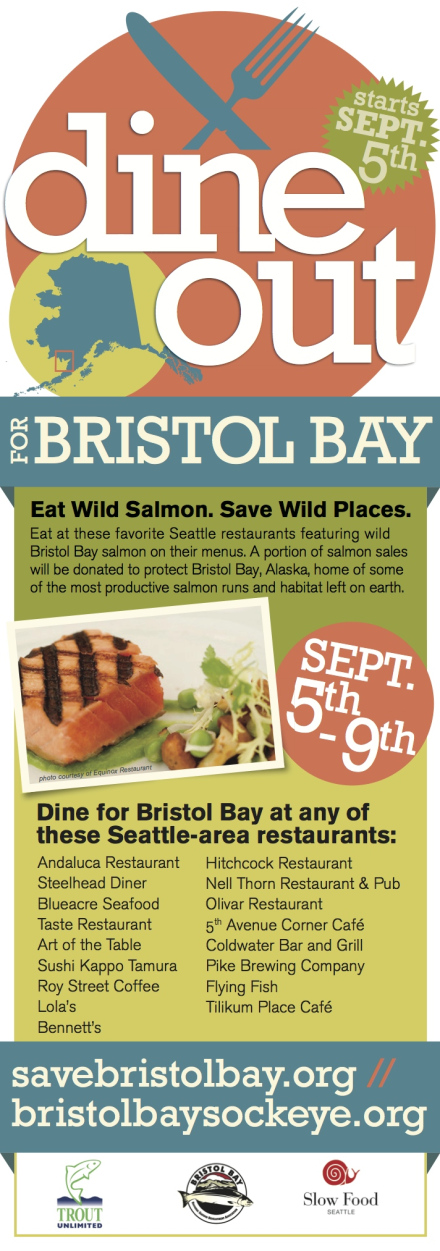Vote with your Fork - Dine out for Bristol Bay.
Slow Food Seattle, Trout Unlimited together again in a command performance!
By Amy Grondin
September 2011 will mark the 4th year that Slow Food Seattle and Trout Unlimited will partner to raise awareness of Bristol Bay, Alaska, its pristine environment, hardworking people and wild salmon. In celebration of Bristol Bay’s salmon fisheries, 17 Seattle-area restaurants will proudly serve wild Bristol Bay salmon from September 5th – 9th. Dining out at one of the supporting restaurants is a delicious and easy way to say the future of Bristol Bay matters. Directly invest your food dollars in Bristol Bay’s sustainable salmon fishery by ordering a meal featuring wild salmon and show that it’s a wild food source that you value. Join us in the fight to save our nation’s last great salmon fishery. See below for the list of restaurants.
Were you a Slow Food Seattle member four years ago when we first decided to partner with Trout Unlimited in their Savor Bristol Bay campaign? Then you are familiar with the background details of the Pebble Mine issue and we thank you for being a part of the on going efforts to protect Bristol Bay.
If you are a new Slow Food Seattle member you may be asking, “Why do we need to save Bristol Bay and from what?” A quick primer on the issues follows but this link will satisfy those of you who want more: www.savebristolbay.org/about-the-bay/about-pebble-mine.
Multinational foreign mining companies are proposing one of the world’s largest gold and copper mines (known as the “Pebble Mine”) in the headwaters of Bristol Bay’s salmon-producing watershed. This is a wilderness gem that that contains some of the most productive wild salmon rivers left in the world. Thankfully the mine permitting process is years long and it has allowed for time for Trout Unlimited to inform the public on the issues.
If the Pebble Mine were to be permitted and allowed to open, the Bristol Bay watershed would be exposed to the persistent chemicals used to extract gold and copper from the mine site. These chemicals once used would be left behind as toxic liquid waste after the mine’s productive days are over, roughly in 50 years. Ten square miles of liquid waste in the resulting containment pond would be separated from Bristol Bay’s interconnected freshwater systems by earthen dams. A spill of the toxic waste or seepage from the containment ponds would irreparably harm the freshwater food web. Since everything returns to the ocean, the marine food web of Bristol Bay would suffer the same fate. Wild salmon play a central role as a keystone species that ties these two food webs together. There isn’t another fish to play this role if salmon don’t survive the good intentions of the Pebble Partnership.
Based on what we’re learned with recent environmental disasters, accidents are often not a matter of if, but instead when. Pick your disaster –a flood, maybe an earthquake? Both are a possibility in Alaska. Our best attempts to engineer our way around Mother Nature’s forces have not proven to be as successful as we had hoped in other parts of our nation. By the way, formal surveys show that 80% of the local population of Bristol Bay does NOT want the Pebble Mine for reasons such as these.
The loss of Bristol Bay’s sockeye would be truly disastrous for the dozens of Alaska Native communities that have caught wild salmon as part of a subsistence lifestyle in Bristol Bay for thousands of years. Bristol Bay Sockeye disappearing would also leave over 12,000 commercial fishermen and processors without work. The loss of Bristol Bay’s salmon fishery would also create ripples in the seafood marketplace as it is the world’s largest sockeye salmon fishery, contributing 40% of the world’s sockeye salmon supply. But there is still time to protect Bristol Bay before mining permits are issued.
This is where Slow Food Seattle members can help! It may seem insignificant to simply make a menu choice to battle a multinational corporation but trust me. It works. In the late 80’s tuna became “Dolphin Safe” because we didn’t eat tuna from un-dolphin friendly companies. Remember the Give Swordfish a Break campaign from the 90’s in which consumers successfully told the market place to change the way they sourced these mighty yet vulnerable fish? With your help in this new decade Trout Unlimited can do the same for the wild salmon of Bristol Bay.
So get out there next week and Vote with your Fork for Bristol Bay - smile and raise your glass to the table next to you that is eating wild salmon, too!
Seattle-Area Restaurants: September 5-9
5th Avenue Corner Cafe - 1900 Fifth Avenue, Seattle, (206) 728-1000
Andaluca Restaurant - 407 Olive Way, Seattle, (206) 382-6999
Art of the Table - 1054 N. 39th Street, Seattle, (206) 282-0942
Bennett's Pure Food Bistro - 700 Broadway East, Seattle, (206) 325-2211
Blueacre Seafood - 1700 7th Avenue, Seattle, (206) 659-0737
Coldwater Bar and Grill - 1900 5th Avenue, Seattle, (206) 728-1000
Flying Fish - 300 West Lake Avenue N, Seattle, (206) 728-8595
Hitchcock Restaurant - 133 Winslow Way E #100, Bainbridge Island, (206) 201-3789
Lola - 2000 4th Ave, Seattle, (206) 441-1430
Nell Thorn Restaurant & Pub - 205 Washington St, La Conner, (360) 466-4261
Olivar Restaurant - 806 E. Roy, Seattle, (206) 322-0409
Pike Brewing Company - 1415 1st Avenue, Seattle, (206) 622-6044
Roy Street Coffee - 700 Broadway East, Seattle, (206) 325-2211
Steelhead Diner - 95 Pine Street, Seattle, WA 98101, (206) 625-0129
Sushi Kappo Tamura - 2968 Eastlake Avenue East, Seattle, (206) 547-0937
Taste Restaurant - 1300 1st Avenue, Seattle, (206) 903-5291
Tilikum Place Cafe - 407 Cedar Street, Seattle, (206) 282-4830

